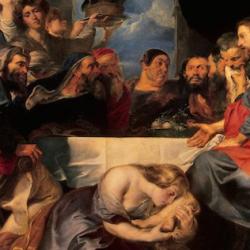Exhortation for January 18:
The parable of the prodigal son has many levels, but one layer is that the story of the prodigal is the story of man. It is the story of Adam. Like Adam, the younger son has a great inheritance, but he despises it. Worse still is his attitude toward his father. In ancient Israel, an inheritance might be divided before a father’s death, but asking for one’s inheritance and then cashing it in was equivalent to acting like the father was dead. It would have been taken as a wish for the father’s death. The younger brother not only despises his inheritance; he despises his father.
Like Adam too, he becomes estranged from his father and exiled from his father’s house; he is, we might say, cast out of the garden. After Adam sinned, he was clothed in animal skins; he had submitted to the voice of a beast, and as a result he became a beast. So also, the prodigal is reduced to feeding pigs, and would in fact prefer to BE a pig ?Eat least the pigs have something to eat. Whatever Jesus is about, it is clear that he has no optimism about the natural capacity or state of humanity. He sees that humanity has degenerated to beasts because of its alienation from the Father. Jesus is happy to eat and drink with sinners, but when He does He knows He is eating and drinking with SINNERS.
Scribes and Pharisees would have recognized this story, and would perhaps have agreed with Jesus’ description of the human race. But Jesus parts company from the Pharisees when He describes the sinfulness of the elder brother. Jesus, you see, doesn’t focus attention only on the overt and spectacular sins of the prodigal, or the kinds of sins that are obvious to everyone. He is not concerned only with the sins of sinners. Jesus does address the sins of sinners, but He also addresses the unrighteousness of the righteous.
In the parable, the elder brother represents the scribes and Pharisees, and his sin is their sin. It is not a pretty picture. When his younger brother returns, he does not rejoice with his father; he is angry, surly, grumbling and resentful. And his anger is expressed in a profoundly bitter speech, one that shows him far more alienated from his father than his younger brother ever was. He never addresses his father as “father.” He doesn’t refer to his brother as a brother; he refers to him as “this son of yours.” He complains that he has never had even a kid goat slaughtered in his honor, much less a fatted calf. When he imagines the reward that he wants to receive from his father, it is not a feast with his father or brother, but a feast where he makes merry with his friends.
He shares in all the good things that his father has, but he is not thankful. Instead, he thinks of himself as a lowly servant in his own father’s house. He speaks of “slaving away” in his father’s house, keeping every last rule that his father made and receiving no reward for all his effort. While his father clearly loves him as a son, he thinks of his father as a tyrant. This is ironic: The younger son comes to the point where he would be grateful to be a slave in his father’s house; the elder son, though not a slave, thinks of himself as a slave, and it bitterly resentful.
Few of us have been reduced to the point where we are tempted to eat carob pods, pig feed. For most of us, the sins of the younger, prodigal son are not our sins. Growing up in the church and in Christian families, our sins are much more like the sins of the elder brother: Self-righteousness, resentment rather than gratitude, surliness rather than joy. We think of being a Christian as a burden to be borne rather than a gift to be received with thanksgiving. We wonder why WE don’t get rewarded as we think we deserve, and we are envious God’s generosity to others. We come to think of God as a tyrant instead of a loving Father.
If you are a prodigal, by all means, repent; abandon your pig sty and come to Jesus. If you are a prodigal, confess the sins of a sinner. But even if you cannot confess the sins of the prodigal, you must confess and repent. You must confess the sins of the “righteous.”











